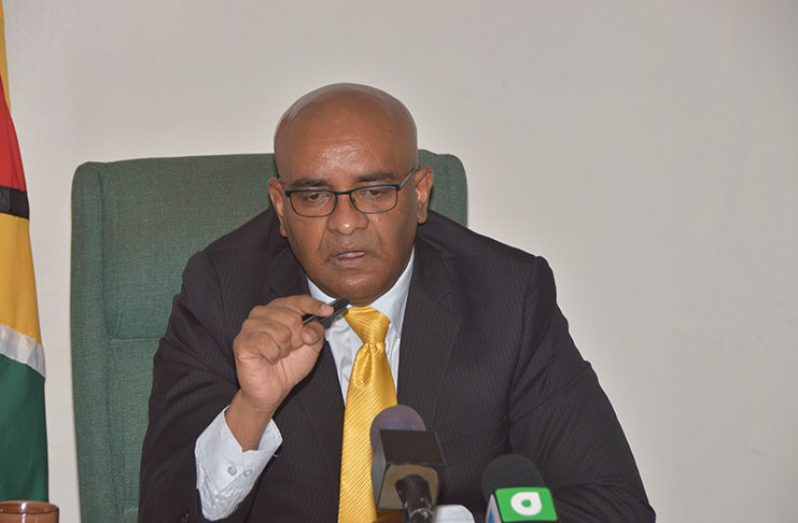— had underscored GECOM’s independence in verifying Official List of Electors
IN total contradiction to his initial position on the process of verifying the Official List of Electors for General and Regional Elections, Leader of the Opposition, Bharrat Jagdeo, is now attempting to dictate how the Guyana Elections Commission (GECOM) should arrive at a fresh list.
In 2006, Jagdeo, the then President of Guyana, had underlined GECOM’s independence. “The law says that GECOM shall define the form of verification of the list, or may decide on verification, and will decide on what form it will take. Not the PPP; not the PNC; not any party. GECOM. That’s a constitutional body; independent just like the courts,” Jagdeo had said back then.
However, today, he is attempting to narrow GECOM’s options for the compilation of a new Official List of Electors ahead of pending elections. A no-confidence motion, which is now being challenged in the appellate court, has triggered the need for early elections and the opposition leader, with the backing of the People’s Progressive Party (PPP) is demanding that the current Official List of Electors be used. According to him, he is also willing to have a limited period for Claims and Objections to verify the list. But with the list due to expire on April 30, 2019, GECOM now has little or no choice but to conduct house-to-house registration to secure a fresh and credible Official List of Electors. According to the Chief Election Officer, Keith Lowenfield, that process will take approximately nine months.
WILL NOT ACCEPT
At a press conference on Thursday last, Jagdeo said the PPP will not accept nationwide house-to-house registration for the compilation and verification of the list.
In a recent interview, one of the country’s leading legal minds said Jagdeo is selective in his interpretation of the constitution, noting that when the opposition leader was in a similar situation as President, he gave the same answers as are being given by President David Granger. “The leader of the opposition is being selectively principled as a constitutional interpreter; let him clean up his own grave yard before condemning other people,” the legal luminary said.
Last week during his high-level meetings with both the opposition leader and GECOM, President Granger said the government will not interfere with the constitutional role and duty of the commission. “Let me make one thing clear, GECOM is an autonomous body, GECOM is an independent agency and there is no part of the constitution which gives the President or the executive in general, authority to interfere, intervene or intrude in the work of the elections commission,” he said in an address to the nation.
INDEPENDENT BODY
He said when GECOM is in a state of readiness, he will set a date for elections.
“It is not for me to overrule the commission. The commission is independent. It is not for anybody to give the commission instructions as to when elections are to be held. Once the commission says it is ready, I will announce a date; and I hope that date is as early as possible. So, the question of the ball being in the President’s court is not a credible position to take,” President Granger said in a separate message.
In the Court of Appeal on Tuesday, the attorney general and a battery of lawyers will argue that the GECOM is constitutionally required to hold elections and not government.
In his written submissions in the case, The Attorney General v The Speaker, The Opposition and Representative of the APNU, in which he is challenging the January 31 High Court decision, Williams told the Court of Appeal that Chief Justice Roxane George-Wiltshire erred and was misconceived in law when she failed to have regard to other provisions of the constitution that impact the holding of elections.
The attorney general said in the past the Elections Commission was not an independent body insulated from government’s involvement, explaining that government, through the President or minister of home affairs, had conduct over the affairs of GECOM. Further, the Elections Commission was not in charge of registration.
“In Notice-Constitutional Appointments (Saturday 18th January 1986), the President was charged with the responsibility with effect from 1985-12-28 of the Registration and Elections office. This changed in 1990 where by Notice-Constitutional Appointments dated 21st July 1990, the minister of home affairs was charged with responsibility for the Registration and Elections Office. Another example is found in Election Laws (Amendment) Act 1990, Act No 25 of 1990, Section 4, which transferred the functions specified in section 4(2) conferred on the minister by the Representation of the People’s Act and the National Registration Act to the elections commission,” he pointed out.
Today, Article 226(1) and (7) guarantee GECOM’s independence. According to Article 226(1), in the exercise of its functions, GECOM shall not be subject to the direction or control of any person or authority.











